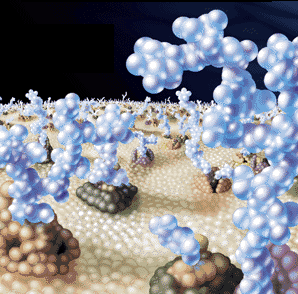Understanding the Marvels of Glycans: What Are Glycans? Function and Value of Glycomics Lab Tests
 What are glycans? Glycans, often referred to as carbohydrates or sugars, are remarkable organic molecules that play vital roles in the human body. While often associated with energy production, glycans offer much more than just a source of fuel. In this blog, we will delve into the diverse functions and immense value of glycans, exploring how they differ from nucleic acids, proteins, and lipids. We will also explore specific laboratory tests, such as the IBDX™ test (e.g. do I have inflammatory bowel disease?), GlycanAge test (e.g. what age you are?), and tumor antigen tests (how my caner will progress?), that highlight the significance of glycans in healthcare.
What are glycans? Glycans, often referred to as carbohydrates or sugars, are remarkable organic molecules that play vital roles in the human body. While often associated with energy production, glycans offer much more than just a source of fuel. In this blog, we will delve into the diverse functions and immense value of glycans, exploring how they differ from nucleic acids, proteins, and lipids. We will also explore specific laboratory tests, such as the IBDX™ test (e.g. do I have inflammatory bowel disease?), GlycanAge test (e.g. what age you are?), and tumor antigen tests (how my caner will progress?), that highlight the significance of glycans in healthcare.
The Versatile Functions of Glycans:
There are several functions of glycans, including the function of glycolipid, the function of glycoproteins, their importance as an energy source, and the body's signaling and communication protocol.
- Energy Production: Glycans, such as glucose, serve as a primary source of energy for cellular metabolism. Through cellular respiration, these carbohydrates are broken down to produce adenosine triphosphate (ATP), the universal energy currency of the body.
- Structural Integrity: Glycans contribute significantly to the structural framework of cells and tissues. For instance, glycosaminoglycans (GAGs), a type of glycan, provide essential support and flexibility to connective tissues. They are the building blocks of components like cartilage, tendons, and the extracellular matrix.
- Cell Signaling and Recognition: Glycans on the surface of cells act as markers for recognition and communication. By interacting with specific receptors, these glycans are involved in crucial cellular processes like immune response, cell adhesion, and signaling cascades.
- Lubrication and Protection: Certain glycans, such as mucins, form gel-like substances that lubricate and protect various epithelial surfaces. These glycan-based barriers play a vital role in maintaining the integrity and function of tissues, such as the digestive and respiratory tracts.
How Glycans Differ from Nucleic Acids, Proteins, and Lipids:
Nucleic Acids: Unlike nucleic acids (DNA and RNA), which store and transmit genetic information, glycans do not participate in genetic coding or protein synthesis. While nucleic acids are composed of nucleotides, glycans consist of carbon, hydrogen, and oxygen atoms, providing distinct functions in energy metabolism and cellular processes.
Proteins: Proteins are diverse macromolecules composed of amino acids, fulfilling crucial roles in enzyme catalysis, structural support, transport, and signaling. In contrast, glycans primarily contribute to energy production, cellular recognition, and structural integrity. Proteins contain nitrogen and sulfur, while glycans consist of carbon, hydrogen, and oxygen atoms.
Lipids: Lipids, including fats, oils, and waxes, serve as energy stores, insulation, and components of cell membranes. Glycans, on the other hand, do not function primarily as energy stores. Instead, they contribute to energy production, cellular recognition, and structural support.
Laboratory Tests Highlighting the Significance of Glycans:
- Test for glucose intolerance commonly used to diagnose glucose intolerance or impaired glucose tolerance is called an Oral Glucose Tolerance Test (OGTT). The test helps diagnose conditions such as prediabetes and gestational diabetes, and it can provide valuable information about an individual's ability to regulate blood glucose levels effectively.
- IBDX™ Blood Test: The IBDX test measures anti-glycan antibodies and aids in the diagnosis and differentiation of inflammatory bowel diseases (IBD), such as Crohn's disease and ulcerative colitis. It helps stratify disease severity, predict treatment response, and identify individuals at higher risk for complications.
- GlycanAge Test: The GlycanAge test assesses biological age based on glycan analysis. By analyzing changes in glycans associated with aging, this test offers insights into overall health, disease risk, and the effectiveness of interventions to slow down the aging process. The GlycanAge test is the only test for biological age that will tell you what age you are and can track changes and improvements.
- Tumor Antigen Tests: Glycans are also involved in tumor biology. Certain tumor antigens, such as CA19-9 and CA125, are glycoproteins that can be measured in the blood. Elevated levels of these antigens may indicate the presence of certain cancers, such as pancreatic or ovarian cancer, respectively.
Conclusion:
Glycans, the unsung heroes of the human body, offer a wide array of functions and hold immense value in various aspects of healthcare. Beyond their role as energy sources, glycans contribute to structural integrity, cell signaling, and recognition. Laboratory tests such as the IBDX™ test, GlycanAge test, and tumor antigen tests demonstrate the significance of glycans in diagnosing diseases, assessing biological age, and identifying specific cancer markers. By unraveling the mysteries of glycans, we can unlock new diagnostic tools, therapeutic strategies, and a deeper understanding of human biology. So, let us appreciate the marvels of glycans and recognize their importance in shaping our health and well-being.